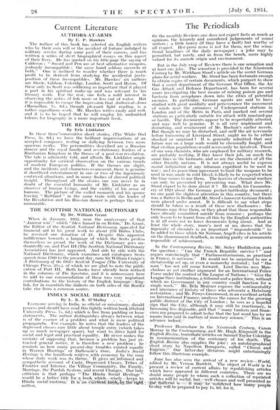Everyone serving in India, as official or missionary ; should possess
and should have read this tightly written bOok(Oxford University Press. 7s..6d.) which is free from padding or loose statements. The author distinguishes alwayS between what ' is of the essence of a problem and what is mere political propaganda. For example, he notes that the. leaders of the depressed classes care little about temple entry (which takes up so much newspaper space), but want todrive hard for social and legal and practical equality. He never makes the mistake of supposing that, because a problem haS' just at- tracted general notice, it is therefore a nevi-- problem he reminds us how many present-day troubles existed' equally in Warren Hastings' or Dalhousie's time. India's Social Heritage is the handbook written with economy by the man whose daily work-.was its theme. • It, gives an informed and sympathetic account of Caste, -Depressed ClasSes; Tribes of Frontier and-Interior, the-Village CoMnninity, the ' Marriage, the Purdah System, and recent Changes. Our only criticism is that perhaps " The Hindu Social Heritage " would be a better title for abook which—wisely--keeps to Hindu- SOeialleitstiliinsf 047..Royokitilftkit2theligait author.










































 Previous page
Previous page